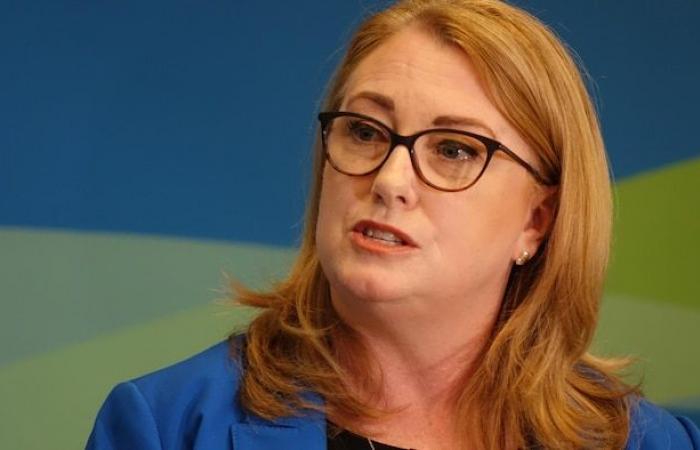The Progressive Conservative opposition in Newfoundland and Labrador was pessimistic, even suspicious, on Tuesday about the possibility of concluding a new partnership with Quebec on the energy of the Churchill River.
The second day of a special, emotional debate on the agreement in principle concerning the power plant Churchil Fallsin the House of Assembly, even gave rise to a lively exchange on the Labrador border, which is still not recognized by the Quebec government.
The Progressive Conservative leader, Tony Wakehaminsinuated, to the applause of his caucus, that recognition of the boundary drawn in 1927 by the Judicial Committee of the Privy Council in London should have been part of the negotiations. The Prime Minister Andrew Furey rejected this idea without hesitation.
This is not part of the discussions, period
said the Liberal leader in the press scrum, evoking the idea ridicule
of the leader of the opposition.
A contract that rhymes with resentment
The agreement in principle under debate aims to replace the current contract on the hydroelectric power station of Churchill Falls – an agreement signed in 1969 which rhymes with resentment in Newfoundland and Labrador and which led to tense relations between Quebec and Saint John.
The contract does not expire until 2041 and sets the price of electricity at 0.2 cents per kilowatt hour, electricity that Hydro-Québec resold at a price 51 times higher in 2023, according to a report detailing the average price of exports.
Negotiators from Hydro Newfoundland and Labrador and the provincial government, present Tuesday to answer questions from elected officials, defended the memorandum of understanding which, according to the government, will allow the hatchet to be buried once and for all. all.
Hydro-Québec agrees to pay much more for electricity from the existing power plant. Newfoundland and Labrador, for its part, allows the construction of new hydroelectric facilities on the river Churchill. The largest proportion of electricity produced will be sent to Quebec.
Open in full screen mode
The Prime Minister of Quebec, François Legault, as well as his counterpart from Newfoundland and Labrador, Andrew Furey, announced the agreement in principle with great fanfare on December 12, 2024 in Saint John. (Archive photo)
Photo: The Canadian Press / Paul Daly
However, progressive-conservative elected officials, who have been calling for an independent evaluation of the highly technical document for weeks, insisted on Tuesday that Hydro-Québec will have the last word regarding the development of new projects – and therefore the thousands of jobs promised to the Labrador thanks to construction sites.
Let’s be clear: Quebec has too much control
declared the MP Lloyd Parrott.
He stressed that under the memorandum of understanding, Hydro-Québec will have the exclusive right for 15 years to build a new power station at Churchill Fallsas well as a new dam at Gull Island. Although Hydro-Québec will be responsible for the construction and will assume almost all the risk, it will nevertheless be able to take hostage
these projects, which represent thousands of direct and indirect jobs.
I don’t follow logic
says the CEO of Hydro NL.
Wanting to be reassuring, the CEO of Hydro NL, Jennifer Williamsrejected the opposition’s criticism and recalled that his province and Quebec wish to work collaboratively.
Hydro-Québec tears up a contract that gives it access to free electricity for the next 17 years so that it has access to more electricity in the long term
she explained. The idea that Hydro-Québec would want to abandon this project to have us, […] I don’t follow logic.
Open in full screen mode
Hydro Newfoundland and Labrador CEO Jennfier Williams. (Archive photo)
Photo : - / Patrick Butler
She also maintained that if Hydro-Québec decided to no longer continue the construction of Gull Island or from the second power plant to Churchill Fallsrevenues linked to the existing plant would still explode.
According to Newfoundland and Labrador Hydro, the price of electricity from the existing plant will gradually increase from 1.63 cents per kilowatt hour in 2025 to 7.84 cents per kilowatt hour in 2041. In 2056, the price will reach 19.4 cents and, in 2075, 37.24 cents.
Moreover, Jennifer Williams stressed that the electricity available to customers in Labrador would also increase, regardless of what Hydro-Québec decides. This is good news for businesses in the region, particularly mines, whose growth is limited at the moment due to lack of electricity.
The CEO also said that if Hydro-Québec changes its mind and no longer wants to build new hydroelectric facilities on the river ChurchillHydro NL. will have the opportunity to find other partners.
Why sign a new deal now?
On Monday, during his first day in the House of Assembly, Jennifer Williams explained that while the current deal doesn’t expire until 2041, energy companies’ strategic planning lasts for decades. According to her, it was necessary to take action as soon as possible to obtain the best agreement for Newfoundland and Labrador.
She stressed that Hydro-Québec is seeking to double its electrical capacity and must take action now if it wants to meet growing demand. The CEO of Hydro-Québec, Michael Sabiaplans to invest $185 billion in it by 2035.
If the future of the dam Gull Island and the new power plant Churchill Falls remained uncertain, Hydro-Québec would consider other options, even if these alternatives cost more, according to Jennifer Williams.
The special debate continues until Thursday. On Wednesday, two representatives of the consulting firm Power Advisory will testify.







